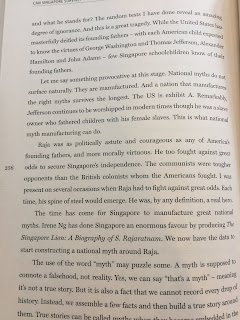 |
National Library, Singapore,
January 9, 2019 |
Mikhail
Melvin Goh, founder of Have Halal, Will Travel (#HHWT), spoke on behalf of Eye
on Asia, a National Library project designed to increase interest
in ASEAN.
A summary of his presentation and ensuing Q&A session is below:
Melvin
was his name before he converted to Islam, and he now goes by the Muslim name Mikhail (a
variation of Michael, the Archangel).
Goh's background in digital marketing has proven highly useful in his current endeavor. His
travel publications reach around 9.4 million viewers.
Melvin calls Muslims--all 1.8 billion of them--the biggest
invisible market segment worldwide. Malaysia, Singapore, and Indonesia have 240 million Muslims. Indonesia in
particular is seeing a boom in its middle class, creating new demands for services and products. Yet, despite these numbers, as
recently as three to four years ago, no major companies were consistently targeting
this group.
Melvin was drinking
ocha/tea at a Mongolian restaurant in Tokyo when a terrorist attack occurred in
Paris. Someone asked him, why are Muslims killing non-Muslims, and what is
halal? Japan’s exposure to Muslims is mostly through its 100,000 domestic Muslim residents. At that moment, he thought to himself, "What if I use this platform I’ve created to facilitate meaningful exchanges?"
Islam means submission "to God." The five pillars of Islam are: shahada (belief in one God, with Muhammad
(PBUH) as his final messenger); salah (prayer); zakat (charity); Hajj
(pilgrimage to Mecca); and fasting (during Ramadan).
Halal means permissible. It impacts multiple industries, including food, cosmetics,
personal care products, and pharmaceuticals. For example, alcohol, which is haram (aka impermissible), is a key ingredient in
many drugs. In terms of lifestyle, key halal areas include food, travel, fashion,
and Islamic banking (sharia-compliant finance).
What's the biggest trend in travel? Muslims are looking for authentic travel
experiences. 74% “wish to immerse themselves in culture.” Japan is an oft-cited
destination. Sight-seeing and local food are top desires.
About
20% of Muslims [geographic area not specified] are highly educated--doctors, engineers, and scientists who
travel frequently.
Muslim
travelers want autonomy, authenticity (to live like locals), and a sense of
belonging.
Goh's recommendations
for businesses: take stock what you already have—many workers in larger companies
are already Muslim, so ask them any questions you have; get the basics right; promote your products through the
right channels; and focus on experiences.
Q&A session
Q: The halal designation seems to be overused. Do you ever wonder if your industry is diluting the concept of halal by using it across so many different areas?
A:
Halal is a set of principles but it varies widely; for example, in SE Asia, prawns are
halal, but in many places in the Middle East, they’re not. Certification is not
the only way to go; over-labeling is occurring because of market demand.
Q:
What were your experiences and challenges in working with governments?
A:
“China is using tourism as a weapon” in terms of directing travel agencies not
to send tourists to certain countries when political disputes arise. For example, the number of
Chinese tourists in Korea dramatically dropped for a time because of the Chinese
government’s actions and recommendations. In short, China mixes tourism and
politics. Overall, governments must first realize Islamic travelers are a lucrative market. Some governments
think Muslims are a national security issue and prefer to “wait and see.” In
Australia, some people don’t like Muslims, and windows displaying halal signs
were smashed after terrorist attacks in other countries.
Q:
How do you find halal shops overseas? Some shops aren’t listed even though
they are halal.
A:
It’s [people like] you. Most countries are not like Singapore, top-down, consistent—a lot of things occur
at a grassroots level. We have several ways of getting information. One, as I mentioned, is user
input; second is official government agencies; third is writers.
Q:
How do you scale?
A: Scaling is like piloting a rocketship into space. If you don’t know where
you’re flying to, there’s no point. How much fuel (capital, user engagement) do you put into the rocket? In which direction do you point the rocket?
Q:
What are your sources of income?
A:
Consulting for airlines and delivery services, especially in the area of
customization for Muslim customers.
Q:
How do you reach out to your 9.4 million viewers and build trust?
A:
We found people who were interested in the same things as us, and who were
willing to give information because they believed in us. We gain trust by
having standards and having a vision. We are not separatists—we do not say, “We
are halal, you are not.” We believe in integration. Be human, stand for
something.
Q: How do you see Singapore's role in halal issues?
A:
We are a multi-ethnic population. We have been living side by side for a very
long time. We are very blessed because of our history. One of the things Singapore
faces as a challenge is the articulation of the next step. Why would I travel if I'm going to eat the same thing [in Singapore as in Indonesia]? It becomes a question of story-telling and
differentiation. The key is to improve services across the board, not just
food. Thankfully, governments are willing to listen.
Q:
What is the future for halal travel in Thailand?
A:
Thailand, like Singapore, is very blessed [in terms of diversity]. Bangkok has whole streets with
Muslim businesses. Thailand is also blessed in terms of geography—its time zone
means short flight times for ASEAN residents. People are nice. The challenge for the Thai government
is to get tourists out of Bangkok and into places like Chiang Mai, Chiang Rai, etc.















